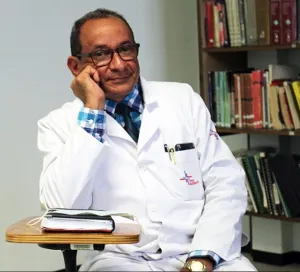Tlaxcala is one of the 31 states of Mexico, the smallest. Its capital is Tlaxcala de Xicohténcatl and has a population of 1 million 342,977 inhabitants, according to 2020 data. At an altitude of more than 2,000 meters above sea level, it was an area populated by cultures such as the Olmec-Xicallanca to the south and the Otomi to the north.
It is also one of the nine Mexican states with Cuban medical collaboration:
Under the medical collaboration agreement between the governments of Cuba and Mexico, 414 collaborators serve in the country; of them, 410 direct specialists in medical assistance and four members of the National Coordination There are professionals from 27 medical specialties are present including Cuban doctors located in the states of Nayarit, Colima, Oaxaca, Campeche, Veracruz, Zacatecas, Sonora, Baja California and Tlaxcala.
Dr. Jorge López Romero is a specialist in nephrology and coordinator of the Cuban doctors in the Mexican state of Tlaxcala. We arrived there for our interview on a recent November morning, at the hospital in the capital. He was on duty, clean, in an impeccable white coat, with the usual humility:
Dr. Jorge López Romero— “We are currently distributed in ten municipalities, we are a total of 69 collaborators and with the arrival of two more specialists in internal medicine, we will be 71 professionals. We have been well received by the health units and their directors in the different healthcare activities that we carry out in the health areas of the regional hospitals. The warmth of the Mexican managers and professionals towards us is evident. And when one monitors the satisfaction of the patients, it is evident that they are very happy with our presence and tell us, “We were waiting for you, Doctor! There are many difficulties with specialties and we are covering those deficit areas.
“The brigade is dominated by the specialty of family medicine with twenty-five professionals. Other specialties such as endocrinology, nephrology, ophthalmology, cardiology, oncology, orthopedics, geriatrics or pneumology are also represented; an important range includes intensive care medicine. We have been asked if obstetrician-gynecologists are coming and we think they should come at some point”.
Maribel Acosta Damas— What is the health situation of the population and what is the particularity in this state with the presence of Cuban doctors in hospital facilities?
Dr. Jorge López Romero— “In our opinion, the design for our participation in the health system is adequate, based on the joint work of Cuban and Mexican specialists. We are inserting ourselves in the work system already established here and complying with the protocols, we make collegiate decisions to have a greater impact on health results. There are priorities of attention determined in the articulation of the primary and secondary health system and it is for the sake of this link that our work here is taking place. We have physicians working in family medicine and intensive care medicine, but at the moment we are covering the demands of hospital specialties.
“Another of the health priorities in Mexico is the maternal and infant program, which coincides with the health priorities in Cuba; hence the demand for this specialty to reduce infant and maternal mortality. In particular, this state has other health problems such as the incidence of chronic kidney disease. We
consider that the nephrology specialty here has an important challenge beyond health care, but also in the research area due to the prevalence of the disease in young people. In the Tlaxcala hospital itself there are about 300 patients undergoing peritoneal dialysis, which is a significant number. Those are the ones registered, but we know that there are many others without attention. That is why Cuban nephrology specialists have been prioritized in this state”.
Maribel Acosta Damas— How is the relationship with Mexican colleagues going?
Dr. Jorge López Romero— “We inserted ourselves in the work system already designed. At the beginning of our arrival, there may have been rejection by some professionals and colleagues, but we have reversed that because we are showing that we did not come to impose, we came to join in so that, working together, health indicators improve”.
Maribel Acosta Damas— And how is the relationship with patients?
Dr. Jorge López Romero— “It is beautiful; it is one of the things that most stimulates us to continue working. It is evident in the gestures in the medical office, when we visit patients… Patients are grateful to have a qualified professional to attend to them in specialties that are in such high demand as nephrology, for example. They tell us: Doctor, it’s good to have you here!”
Maribel Acosta Damas— Doctor, is this your first mission?
Dr. Jorge López Romero— “No. This is my sixth mission. Twice in Africa, in Rwanda where we set up a hemodialysis service, in Angola as clinical director in private clinics, in Ecuador doing renal transplants in the public sector, in Venezuela before coming here… these are some of the places where I have cooperated. From the human point of view, this mission is very important because we have a great commitment. And we have the fundamental challenge of bringing health and humanity like so many Cuban collaborators in the world. We are used to giving ourselves regardless of what class we belong to or what the social condition of those who come to our office is. We are proud of that. This is a recent mission and we have to keep on going down the road.
Source: Cuba en Resumen

